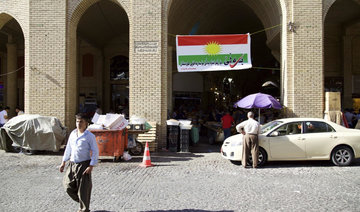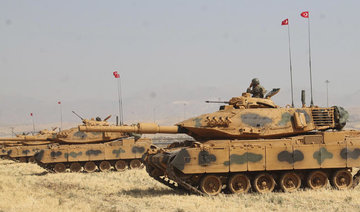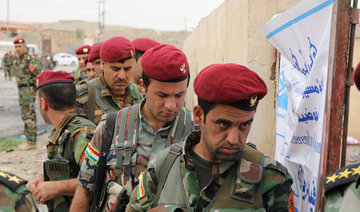BAGHDAD: Turkey's Prime Minister Binali Yildirim said the semi-autonomous Iraqi Kurdish region's offer to freeze the results of the referendum on independence will not redress the "devastation" the vote has caused in Iraq.
Yildirim spoke on Thursday, a day after Iraqi Prime Minister Haider Al-Abadi visited Turkey to discuss possible steps against the Iraqi Kurdish leaders.
Yildirim said the two sides discussed the possible opening of a border gate between Iraq and Turkey that would bypass the Iraqi Kurdish region.
Yildirim's remarks came as Turkey's Foreign Minister Mevlut Cavusoglu said the Iraqi Kurdish offer for last month's referendum on independence to be frozen is "not enough," instead urging the Irbil government to cancel the vote.
"It is an important move that the northern Iraqi administration takes a step back but it is not enough. This referendum should be cancelled," Cavusoglu told a press conference in Ankara.
Turkey, along with Baghdad and other neighboring countries, strongly opposed the Iraqi Kurds' non-binding vote on independence.
The Kurdistan Regional Government, led by Massud Barzani, said on Wednesday it would propose to the federal government "the freezing of the results of the referendum... and the start of an open dialogue" on the basis of the constitution.
However, Iraqi Prime Minister Haider Al-Abadi said Baghdad would only accept the annulment of the referendum.
The Kurdish offer came after Iraq seized large areas of territory that Kurdish forces had captured over the years beyond the borders of the autonomous region.
Yildirim appeared to dismiss the impact of the offer.
"The northern Iraq administration can take whatever decision it wants from now on, it is obvious the decisions will not produce a result that would compensate for the damage," he said at a press conference in Ankara with Somali Prime Minister Hassan Ali Khaire.
Al-Abadi was in Ankara on Wednesday where he met Yildirim and President Recep Tayyip Erdogan to discuss the vote among other regional issues.
The leaders promised to strengthen cooperation as ties between their two countries as ties warm over their shared opposition to the vote.
President Recep Tayyip Erdogan on Wednesday offered Turkish support for the reopening of a pipeline that would allow the central Iraqi government to export oil directly to Turkey, bypassing the Iraqi Kurdish region.
The spokesman for the US-led coalition said the fighting between Iraqi government and Kurdish forces has impeded the movement of coalition military equipment in both Iraq and Syria, negatively impacting the campaign against Daesh.
The US uses the border between Iraq's Kurdish region and Syria to access its Syrian allies, the Kurdish-led Syrian Democratic Forces who are battling Daesh.
Sporadic clashes have erupted over the past two weeks as Iraqi government forces moved to retake territory that was under federal control before IS blitzed across the country in 2014. The clashes have recently moved near the border with Syria.
Army Col. Ryan Dillon said on Thursday that the fighting has "negatively impacted Coalition efforts to defeat Daesh, specifically the inability to move military equipment and supplies to our partners both in Iraq and Syria."
Iran's Supreme Leader Ayatollah Ali Khamenei said he supported efforts by the Iraqi government to ensure its "unified sovereignty and territorial integrity."
That's according to a report on the official website for Khamenei.
The website quoted Khamenei as making the comments during a visit on Thursday with Al-Abadi.
Khameni also reportedly warned Al-Abadi about US policy toward Iraq, saying: "Be careful about Americans deceit and never trust them."
Al-Abadi reportedly replied: "We protect the unity and integrity of Iraq with high precision ... we will not allow the danger of disintegration to put our country at risk."
Iraqi prime minister has announced a multi-pronged operation to capture a series of towns and villages near the Syrian border from the Islamic State group.
Al-Abadi's statement issued early on Thursday said the operation aims to liberate Al-Qaim and Rawa, as well as other villages — the very last remaining strongholds of IS militants in Iraq.
Al-Abadi, who's in an official visit to Iran, says Daesh terrorists only to choose "death or surrender."
Iraqi state TV aired live footage showing military vehicles advancing in a wide desert area, along with Shiite-dominated paramilitaries known as the Popular Mobilization Forces.
Daesh has been driven out of most of the territories it seized in 2014, from northern Iraq through the country's central region and across the western Anbar province.
The Kurdish leadership is saying that Iraqi troops have launched "an offensive" against Kurdish fighters near the border with Turkey.
From Baghdad, a spokesman for the mostly Shiite militia fighters known as the Popular Mobilization Forces says the Kurdish troops opened fire on the Baghdad-led forces as they moved toward the Iraqi Turkish border on Thursday.
The development is part of a recent government push to deploy forces in areas claimed by both the Kurds and the central government in Baghdad.
The spokesman, Ahmed al-Asadi, told The Associated Press that the clashes did not result in any casualties.
The statement from the Kurdish regional government says the Iraqi forces were "using heavy artillery... advancing toward peshmerga positions."
Sporadic clashes have erupted over the past two weeks as Iraqi government forces moved to retake territory that was under federal control before the Islamic State group blitzed across the country in 2014.
The moves follow a controversial referendum last month in which the majority of Kurds voted for independence from Baghdad.
Iraq's prime minister said he would only accept a full cancellation of the Kurdish independence vote and its results, dismissing a proposal by the autonomous Iraqi Kurdish region to freeze the referendum results pending negotiations with Baghdad.
Al-Abadi said the central government "will accept only the cancelling of the referendum and following the constitution," according to a written statement released by his office.
Al-Abadi's announcement comes during a visit to Iran on Thursday.
The Kurds' referendum last month overwhelmingly backed independence from Baghdad. Though the vote was non-binding, it has roiled tensions with the central government and the region.
Sporadic clashes have erupted over the past week between Kurdish and Iraqi forces, former allies in the battle against the Islamic State group.
Iraqi Kurdish leaders on Wednesday offered to freeze the referendum results in order to facilitate talks with Baghdad and end the violence.
Al-Abadi was in Iran after recent stops in Turkey and Jordan, and meetings with US officials and allies eager to pull Baghdad into their political orbit.
He first attended an official reception at a government estate north of Tehran and is meeting with Senior Vice President Eshaq Jahangiri on Thursday.
Regional issues and bilateral ties are expected to dominate the agenda, as well as the Iraqi Kurds' independence referendum last month that both Baghdad and Tehran have dismissed as illegal.
Iran remains a major player in the war against the Islamic State group and culturally across Iraq, its one-time bitter enemy when Iraqi dictator Saddam Hussein waged an eight year war on Iran in 1980s that left more than one million casualties on both sides.
Turkey: Iraqi Kurdish vote caused 'devastation'
Turkey: Iraqi Kurdish vote caused 'devastation'

Jordan hospital offers injured Gazans hope for recovery

- Israel’s 15-month offensive in Gaza left the coastal enclave a wasteland of rubble that will take years to rebuild
AMMAN: Karam Nawjaa, 17, was so badly injured when an Israeli strike hit his home in Gaza nearly a year ago that his own cousin, pulling him from the rubble, did not recognize him.
After rushing Karam to hospital he returned to continue searching for his cousin all night in the rubble.
In that strike on Feb. 14, 2024, Karam lost his mother, a sister and two brothers. As well as receiving serious burns to his face and body, he lost the ability to use his arms and hands.
Now, the burns are largely healed and he is slowly regaining the use of his limbs after months of treatment at a hospital run by Doctors Without Borders in the Jordanian capital Amman which operates a program of reconstructive surgery.
“I only remember that on that day, Feb. 14, there was a knock on our door ... I opened it, my brother came in, and after that ... (I remember) nothing,” he said.
“Before the war I was studying, and thank God, I was an outstanding student,” Karam said, adding that his dream had been to become a dentist. Now he does not think about the future.
“What happened, happened ... you feel that all your ambitions have been shattered, that what happened to you has destroyed you.”
Karam is one of many patients from Gaza being treated at Amman’s Specialized Hospital for Reconstructive Surgery, Al-Mowasah Hospital. He shares a room there with his younger sister and their father.
“All these patients are war victims ... with complex injuries, complex burns ... They need very long rehabilitation services, both surgical but also physical and mental,” said Moeen Mahmood Shaief, head of the MSF mission in Jordan.
“The stories around those patients are heartbreaking, a lot of them have lost their families” and require huge support to be reintegrated into normal life, he added.
Israel’s 15-month offensive in Gaza left the coastal enclave a wasteland of rubble that will take years to rebuild.
Displaced Palestinians have been returning to their mostly destroyed homes after a ceasefire came into effect on Jan. 19.
Syria’s leader Sharaa named president for transitional period, state news agency says

- The news cited commander Hassan Abdel Ghani
CAIRO: Syria’s de facto leader Ahmed Al-Sharaa was named as the country’s president for the transitional period, the Syrian state news agency reported on Wednesday, citing commander Hassan Abdel Ghani.
Jordan’s king meets Belgian monarch in Brussels

- Parties discuss recent developments in the Middle East
- King Abdullah expresses Jordan’s commitment to enhancing partnership with EU
LONDON: The King of Jordan Abdullah II met King Philippe of Belgium in Brussels on Wednesday, accompanied by Crown Prince Hussein.
The monarchs discussed recent developments in the Middle East and stressed their commitment to supporting efforts for peace and stability in the region, the Jordan News Agency reported.
King Abdullah spoke of Jordan’s commitment to enhancing its partnership with the EU during a meeting with top European officials, including Ursula von der Leyen, the president of the European Commission; Roberta Metsola, the president of the European Parliament; and European Council President Antonio Costa.
Jordan and the EU signed a strategic partnership on Wednesday in which the EU pledged €3 billion in financing and investments for Jordan.
In his meeting with EU officials, the Jordanian monarch affirmed his country’s commitment to the establishment of a Palestinian state in the Occupied Territories and warned of the escalation of action in the West Bank, the Jordan News Agency added.
He emphasized the importance of increasing the flow of humanitarian aid and maintaining the ceasefire agreement between Hamas and Israel, which ended the 15-month conflict in Gaza.
Lebanon official media reports Israeli strike in south

- “An enemy drone” carried out a strike targeting a house in Yohmor
BEIRUT: Lebanese official media said an Israeli strike hit south Lebanon on Wednesday, the second consecutive day to see such a raid despite a fragile ceasefire between Israel and Hezbollah.
“An enemy drone” carried out a strike targeting a house that “had been destroyed in a previous raid” in south Lebanon’s Yohmor Al-Shaqeef, the National News Agency said.
Israeli troops to remain in Jenin refugee camp, defense minister says

- Israel Katz: ‘Jenin refugee camp will not be what it was’
- Palestinian Authority condemns ‘provocative’ comments by Katz
JENIN, West Bank/JERUSALEM: Israeli troops will remain in the Palestinians’ Jenin refugee camp once the large-scale raid they launched last week is complete, Defense Minister Israel Katz said on Wednesday as a crackdown in the occupied West Bank extended into a second week.
Hundreds of Israeli troops backed by helicopters, drones and armored vehicles have been fighting sporadic gunbattles with Palestinian militants while carrying out searches in the streets and alleyways for weapons and equipment.
“The Jenin refugee camp will not be what it was,” Katz said during a visit to the refugee camp. “After the operation is completed, IDF forces will remain in the camp to ensure that terrorism does not return.”
He did not give details and a military spokesperson declined to comment.
The Palestinian foreign ministry condemned what it called Katz’s “provocative” statement and called for international pressure on Israel to stop the operation, which has already been condemned by countries including France and Jordan.
Israeli forces went into Jenin immediately after the start of a six-week ceasefire in Gaza, saying it aimed to hit militant groups including Hamas and Islamic Jihad, both of which receive support from Iran.
Israel regards the West Bank as one part of a multi-front war against Iranian-backed groups established around its borders, from Gaza to Lebanon and including the Houthis in Yemen, and it turned its attention to the area immediately after the halt to fighting in Gaza.
At least 17 Palestinians, including six members of armed militant groups and a two-year-old girl, have been killed in Jenin and the surrounding villages during the operation, according to Palestinian officials.
The military said forces had killed at least 18 militants and detained 60 wanted individuals, dismantling over 100 explosive devices and seizing a weapons manufacturing workshop.
An investigation into the death of the girl is still ongoing, a spokesperson said.
Within the camp, dozens of houses have been demolished and roads have been dug up by special armored bulldozers, driving thousands of people from their homes. Water has been cut and Palestinian officials say at least 80 percent of the camp’s inhabitants have been forced to leave their homes.
“It’s terrifying, the explosions the fires, the houses which were demolished,” said Intisar Amalka, a displaced camp resident who said her nephew’s car had been destroyed by an Israeli bulldozer.
The Jenin refugee camp, a crowded township built for descendants of Palestinians who fled their homes or were driven out in the 1948 Middle East war around the creation of the state of Israel, has been a center of militant activity for decades and the target of repeated raids by Israeli troops.
Just prior to the latest raid, security forces of the Palestinian Authority, which exercises limited governance in parts of the West Bank, conducted a weeks-long operation of its own in a bid to reassert control in Jenin.
As the fighting in Gaza has subsided, at least for the moment, Israeli forces have stepped up operations across the area, setting up checkpoints and roadblocks which have made traveling even short distances between towns and villages an hours-long trial for Palestinians.
Elsewhere in the northern West Bank, Israeli forces have been carrying out an operation in Tulkarm, another volatile city where they have clashed repeatedly with militants recently, moving into the city itself as well as into its refugee camp.
The West Bank, a kidney-shaped stretch of land about 100 kilometers (62 miles) long, was seized by Israel in the 1967 Middle East war and is seen by Palestinians as the core of a future independent state, along with Gaza.
It has seen a surge in violence since the start of the war in Gaza in which hundreds of Palestinians have been killed, many of them armed gunmen but also including stone-throwing youths or uninvolved civilians, and thousands have been arrested.
Palestinian attacks in the West Bank and Israel have also killed dozens of Israelis.





















